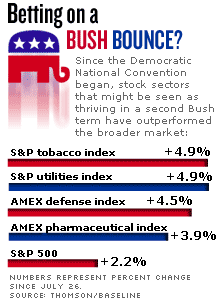NEW YORK (CNN/Money) -
What kind of "bounce" will President Bush get from the Republican National Convention this week?
Aside from watching the poll numbers, some Wall Street analysts think there's another indicator worth following: the performance of stocks that could benefit if he gets re-elected. Since the Democrats' convention last month, those stocks have seemed to be betting on a Bush win.
But hitching your portfolio's wagon to one candidate or the other based on election developments could be a risky bet.
Since July 26, when the Democrats convened in Boston, stock sectors that should thrive in a second Bush administration -- according to conventional wisdom, anyway -- have outperformed the broader market. The defense, utility, tobacco and pharmaceutical industries have gained 4 to 5 percent, while the S&P has risen about 2 percent.
Investors in those sectors may be taking their cue from the Iowa Electronics Markets, whose presidential futures contract has shifted in Bush's favor during that time. On July 26, futures traders believed Bush had only a 49 percent chance of winning in November. As of Monday, the first day of the RNC, Bush's chances had risen to 55 percent.
"There are a lot of factors that go into decision-making" about which stock sectors investors choose, said Michael Panzner, head of sales trading at Rabo Securities USA. "But on a whole, [these sector gains] are consistent with the view that Wall Street expects the election outcome will be favorable to the Republicans."

Some analysts, in fact, believe that stocks as a whole have thrived in recent weeks because Bush has lately gained ground on Massachusetts Sen. John Kerry, his rival in November.
Wall Street is widely seen as favoring a Bush victory, since Bush's policies -- particularly the tax cuts he pushed through in the first three years of his presidency -- are seen as favoring the interests of businesses and stock investors.
"As the odds of a Bush victory fell in the summer, so did the stock market. In the past two weeks ... controversy has dragged Senator Kerry down, and stock prices have gone up," Brian Wesbury, chief economist at Griffin, Kubik Stephens & Thompson, and a vocal supporter of Bush's policies, wrote in a note to clients.
He suggested that the stock market had improved because, "As of today, the odds of a tax hike are less than they were a few weeks ago."
| Related stories
|

|
|
|
|
Other analysts believe this is overstating the case just a smidge.
"I've attached little or no significance to blue and red stocks," said Charles Blood, director of financial markets and economic analysis at Brown Brothers Harriman. "There is this sort of popular sense that Republicans are good for business and Democrats are bad, but I think that's a colossal mistake, because it makes you think about the wrong sort of stuff."
More important than politics, in the view of Blood and other analysts, are the fundamentals of the economy and corporate earnings, over which presidents have surprisingly little control.
Many of the Bush-friendly stocks -- drugs, utilities and tobacco, for example -- are also defensive stocks, and their recent gains could simply be a sign that investors are still nervous about the broader market's prospects.
"The rotation has more to do with defensiveness and dividend yield, than with the actual quality of the investments themselves," said Sam Stovall, chief investment strategist at Standard & Poor's.
Certainly, some sectors could benefit or suffer more than others under Kerry or Bush. For example, while a Kerry presidency might hurt drugs and tobacco, it could boost alternative energy, some health-care sectors and discount retailers, according to some analysts.
But the impact could be marginal, and recent gains in Bush-friendly sectors could be the result of some traders making bets at the margins. If Bush's fortunes slip again, or if the race remains as tight as it has been, then these sectors could lose ground again, as fickle speculators flee.
"Anybody investing on the assumption of who's going to win the election is skating on thin ice," said James Awad, chairman of Awad Asset Management.

|